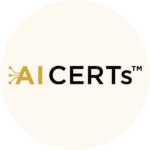
AI CERTS
6 months ago
Why Advanced AI Governance Course is essential:
As Artificial Intelligence (AI) transforms industries and becomes increasingly integrated into daily operations, the need for comprehensive governance over these technologies is critical. Advanced AI governance courses are designed to equip professionals with the skills needed to ensure that AI is used responsibly, ethically, and in compliance with legal standards. These courses help individuals and organizations navigate the challenges of implementing AI in a way that aligns with ethical principles and protects user data, ultimately building trust and transparency around AI applications.
Introduction:Why Advanced AI Governance Course is essential
An Advanced AI Governance Course is essential for professionals looking to navigate the ethical, legal, and regulatory challenges of artificial intelligence. As AI technologies continue to evolve, organizations must implement responsible AI practices to ensure transparency, fairness, and compliance. This course provides in-depth knowledge of AI policies, risk management, and governance frameworks, equipping professionals with the expertise to lead AI-driven initiatives responsibly. Whether you're a business leader, policymaker, or AI enthusiast, mastering AI governance is crucial for building trust and sustainability in the AI ecosystem.
In this article, we will explore what an advanced AI governance course entails, why it is essential for modern AI-driven businesses, the skills participants can expect to gain, and how it impacts organizational success.

The Importance of AI Governance
AI governance refers to the framework, policies, and practices established to oversee the ethical development and deployment of AI technologies. It covers crucial elements such as data privacy, bias mitigation, accountability, transparency, and compliance with regulatory standards. Effective AI governance is essential for preventing unintended consequences, such as discriminatory algorithms, breaches of privacy, and lack of transparency.
Organizations are under increasing pressure to ensure their AI systems align with ethical standards and comply with regulations like the GDPR (General Data Protection Regulation) and CCPA (California Consumer Privacy Act). As AI adoption expands, so does scrutiny from both regulatory bodies and the public, making robust AI governance a vital priority.
Related Reading: For more on the significance of AI governance, see Brookings’ approach to the responsible use of generative AI
Key Components of an Advanced AI Governance Course
An Advanced AI Governance Course provides participants with a deep understanding of the policies, frameworks, and ethical considerations involved in AI deployment. Here are some of the core topics typically covered:
1. Ethics in AI Development and Deployment
Ethical AI development is at the heart of AI governance. This includes ensuring AI systems are designed with fairness, transparency, and respect for privacy. Participants in these courses learn about ethical principles and frameworks, such as Fairness, Accountability, and Transparency (FAT) in AI, which guide ethical decision-making throughout the AI lifecycle.
2. Compliance with Data Privacy Laws
Data privacy is a critical aspect of AI governance, as AI systems often rely on vast amounts of personal data. A governance course covers major data protection regulations like GDPR and CCPA, as well as industry-specific standards. By understanding these requirements, participants can ensure that their AI applications are compliant and safeguard user data.
3. Bias Mitigation Techniques
One of the most pressing issues in AI is algorithmic bias, which can lead to unfair outcomes. Courses on AI governance teach participants how to identify, assess, and mitigate biases in AI models. Topics include data preprocessing, balanced dataset creation, and bias auditing practices that help ensure fair and equitable AI systems.
4. Transparency and Explainability in AI
To build trust, AI systems must be transparent and explainable. This means users and stakeholders should understand how AI decisions are made. Advanced AI governance courses cover techniques for achieving explainability, such as model interpretability and post-hoc analysis methods, which clarify how AI models process information.
External Resource: For more insights on transparency in AI, read explainable AI, explainability, and why it matters to organizational designers
5. Risk Management in AI Projects
AI introduces unique risks, including data breaches, bias, and model drift. Effective AI governance requires risk management practices to proactively address these potential issues. Courses cover risk assessment techniques, continuous monitoring, and governance frameworks to help mitigate these risks and ensure AI operates as intended.
6. Implementing AI Governance Frameworks
Participants learn about various AI governance frameworks and tools, such as ISO/IEC JTC 1/SC 42 for AI standards, which provide structured guidance for developing responsible AI systems. Implementing these frameworks enables organizations to standardize their AI processes, aligning them with international best practices.
Why AI Governance Skills are Crucial in Modern Organizations
AI governance skills have become critical as companies seek to deploy AI technologies in a way that meets regulatory standards and public expectations. Here’s why AI governance expertise is essential:
1. Protecting User Privacy and Data Security
In an era where data breaches and privacy concerns are rampant, companies must ensure their AI systems do not compromise user data. Governance skills enable professionals to oversee AI systems with a focus on data protection, building security measures that prevent unauthorized data access.
2. Ensuring Ethical AI Deployment
AI has tremendous power, but if not deployed ethically, it can have negative consequences on society. Trained governance professionals help organizations design AI systems that align with ethical standards, reducing the risk of unintended harm and reinforcing corporate responsibility.
3. Improving Transparency and Building Trust
The lack of transparency in AI systems can lead to mistrust among users and stakeholders. Governance professionals ensure AI models are interpretable and transparent, helping companies communicate clearly about how their AI systems function and make decisions.
4. Avoiding Legal and Regulatory Penalties
Failure to comply with data protection and AI-specific regulations can lead to hefty penalties and reputational damage. AI governance experts guide companies in meeting these legal requirements, avoiding costly fines, and maintaining a positive public image.
Skills Developed Through an Advanced AI Governance Course
Completing an advanced AI governance course equips participants with a comprehensive set of skills necessary for responsible AI management:
1. Data Privacy Management
Participants gain expertise in data privacy laws and learn techniques for anonymizing, encrypting, and securing data in AI applications. These skills are essential for compliance and help organizations protect sensitive user information.
2. Bias Identification and Mitigation
Effective AI governance requires the ability to identify and address biases in data and algorithms. The course teaches bias detection techniques, balanced dataset management, and equitable model training methods.
3. Risk Assessment and Mitigation
AI projects have unique risks, including ethical concerns, bias, and data security issues. Courses provide the knowledge and tools needed to conduct thorough risk assessments and implement proactive measures for risk mitigation.
4. Regulatory Compliance and Ethics
Understanding regulations and ethical principles is crucial for responsible AI. Participants develop expertise in adhering to GDPR, CCPA, and other AI governance frameworks, ensuring their AI systems align with global standards.
5. AI Model Explainability
Explainability is essential for building trust in AI systems. Participants learn techniques to interpret complex models and communicate how AI decisions are made, ensuring transparency in AI-driven processes.
Real-World Applications of AI Governance Skills
AI governance skills are essential across multiple sectors as AI becomes more embedded in organizational processes. Here are a few examples:
1. Healthcare
In healthcare, where patient data and privacy are paramount, AI governance ensures compliance with regulations such as HIPAA. Governance experts help manage data ethically and securely, ensuring that AI systems improve patient care without compromising confidentiality.
2. Finance
In the financial industry, AI models are used for fraud detection, investment forecasting, and customer service automation. Governance professionals oversee these systems, ensuring they comply with regulations, mitigate bias, and provide transparent and accurate financial services.
3. Public Sector and Law Enforcement
AI is increasingly used in law enforcement for surveillance and predictive policing. AI governance experts play a critical role here, ensuring that these systems operate ethically, avoid biases, and adhere to privacy regulations, safeguarding public trust.
The Future of AI Governance
As AI continues to evolve, the role of governance professionals will become even more significant. Future trends in AI governance may include:
- Stricter Regulations: New and evolving regulations around AI will require governance experts to stay informed on global standards, ensuring AI systems comply with the latest policies.
- Ethical AI by Design: Future AI systems may need to include ethics from the outset, focusing on fairness, transparency, and inclusivity. Governance professionals will play a key role in designing and implementing these standards.
- Advanced AI Auditing Tools: Automated auditing tools are expected to evolve, helping governance experts monitor compliance, detect biases, and assess AI models’ ethical performance more efficiently.
Use the coupon code NEWCOURSE25 to get 25% OFF on AI CERTS' certifications. Don't miss out on this limited-time offer! Visit this link to explore AI Goverment course and enroll today.